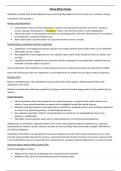Meta-Ethics Notes
Metaethics is about what moral judgments mean and if anything makes them true or false (e.g., murder is wrong)
It questions what morality is.
Realism and Anti-Realism
Moral Realism: there are mind independent, external moral properties and facts. So, for the “murder is
wrong” example, the property of “wrongness” exists in the external world; it is mind independent.
Moral anti-realism: moral properties and facts are mind dependent. This means the property of “wrongness”
is not objective, it prompts feelings in you.
Both moral realism and anti-realism are concerned with the nature of reality.
Parallel Debate: Cognitivism and Non-Cognitivism
Cognitivism: moral judgments express cognitive moral states (beliefs) about reality which can be verified by
observation as true or false.
Non-Cognitivism: moral judgments are non-cognitive states about reality (opinions) which are neither true
nor false.
Cognitivism and Non-cognitivism are concerned with the language of moral statements, whether they are
verifiable or merely matters of opinion.
Moral realism goes with cognitivism as moral statements are true or false because they exist objectively in reality.
Moral anti-realism goes with non-cognitivism as moral statements are neither true nor false as they’re subjective.
Direction of Fit
Mind-to-world direction of fit (cognitivism) [change mind to fit world]: making a belief based off what exists
objectively in the world.
World-to-mind direction of fit (non-cognitivism): [change world to fit mind] changing what is in the world to fit your
opinion
Moral Naturalism
Moral Naturalism claims moral properties are natural properties - a feature of the world which you can
observe. Some natural properties are empirically investigable through the natural sciences.
Reductive naturalism believes moral properties are identical to properties which can be tested by experience,
or science (e.g., pleasure=goodness, a psychological property).
Non-reductive naturalism, believes moral properties are natural but not investigable by science (e.g.,
goodness = eudaimonia)
Ultimately, moral properties supervene on natural properties; are fixed by natural properties.
Utilitarianism is considered a reductivist theory, they reduce what is good to singular properties (e.g., pleasure)
measured by the hedonic calculus. Pleasure and pain are the only things which are morally valuable. Mill builds on
this calling it happiness.
Aristotelian Virtue Ethics is a naturalist theory because eudaimonia is part of the natural world (you can use terms
from the natural world to describe it), and it is a natural fact that the function of humans is to reason. However, AVE
is non-reductivist because you cannot pin down eudaimonia to a singular property. Eudaimonia is a constant activity.
Argument against moral realism: Hume’s Fork
Truths (knowledge) are either:
Matters of fact: they are contingently true and based on the world OR
Relation of ideas: they are necessarily true and are abstract truths.
, However, moral statements are neither.
They are not relation of ideas because they aren’t conceptual truths (e.g., black is the opposite of white) and are not
fundamentally a relation of ideas, there is nothing in the statement murder is wrong that gives us the idea it is wrong
(not analytically true).
They are not matters of fact because you cannot empirically test or observe “wrongness” in murder (e.g., if someone
committed suicide).
- Therefore, moral statements are not knowledge, and we know nothing about them.
Another argument against moral statements: “is ought gap”.
- Hume draws a gap between what “is” the case (a fact) and what “ought” to be the case (a value).
- He questions how we go straight from the premise to the conclusion and why we assume a connection.
- Hume says when “murder causes suffering” turns into “we ought not to murder”, we are expressing a new
affirmation.
- He says there is a gap, and a reason needs to be provided for the deduction from the prescriptive to the
descriptive.
- Therefore, he says we cannot truly know moral “truths” as they are inferred from premises without
justification.
Naturalistic Fallacy (Moore)
- Moore says that you have jumped from stating a natural property to an ethical property.
- This relates to Hume critiquing how we jump from the descriptive to prescriptive.
- Therefore, it is easier argue for intuitionism.
- Moore’s naturalistic fallacy (development of is-ought gap) can’t define ethical terms (good) in
non-ethical (natural) terms (e.g., pleasure), this is a logical error. Like how you cannot jump from
an “is” to “ought” statement.
You can say that pleasure and good are correlated and can say that pleasure has the property of being
good, but you cannot say that pleasure is equal to good.
Goodness is a non-natural property, a simple concept which cannot be defined.
Simple concepts are self-evident and sui generis (e.g., colour yellow, you can’t describe yellow but you
know it when you see it).
Moore thought the same is true of goodness – we simply know within ourselves – intuitively – whether
something is right/wrong.
- Known through rational intuition and reflection upon the judgment itself.
Response (utilitarianism)
- Mill argues that intuitionists do not go far enough. If you ask an intuitionist to describe “good”, they will end
up saying good is pleasure. So naturalistic fallacy fails.
Further problem with intuitionism
- If morality is intuitive, then there should not be disagreements in moral matters (e.g., abortion)
Why naturalistic fallacy may not be a real fallacy.
- Properties exist in the external world; concepts are an intellectual package pointing to properties.
- Naturalistic fallacy is not a fallacy because “pleasure” and “good” are merely different concepts referring to
the same property (e.g., H20 and water)
- No gap, or naturalistic fallacy
- Can accept that Moore has proven that pleasure=good isn’t an analytic truth, but they could just be two
separate concepts referring to the same property in the external world.
Moral Naturalism and Moral Non-Naturalism




